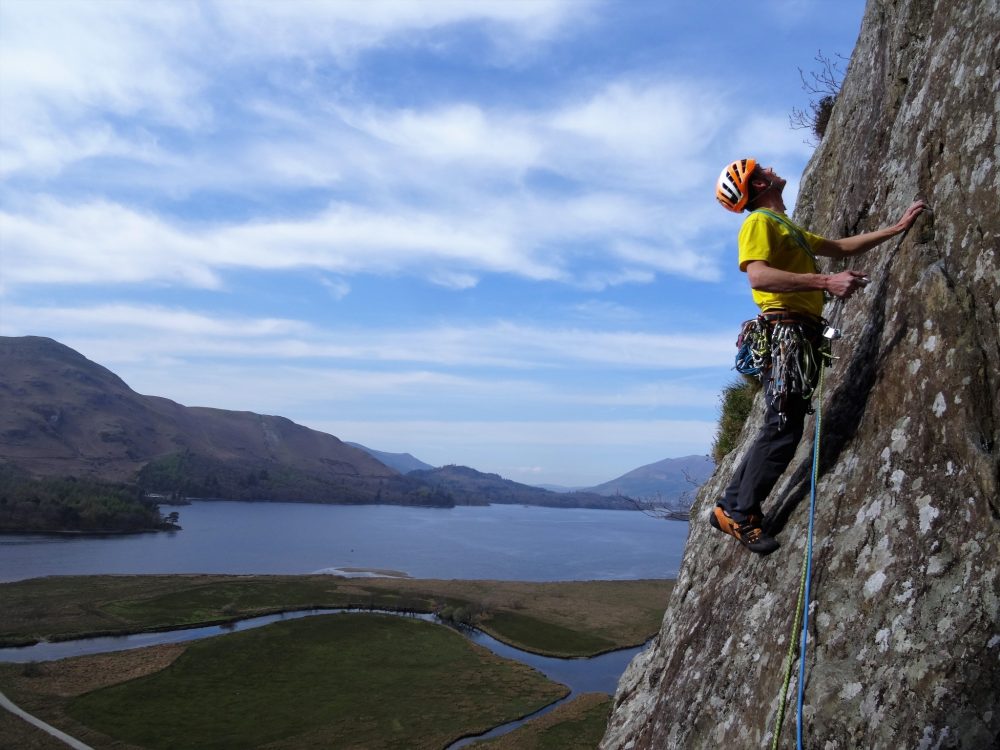Why We Love British Trad Climbing!
Why we love British trad climbing!

ISM Director and British Mountain Guide Adrian Nelhams, who lives in the Lakes, tells us what he loves about British trad and his approach to going climbing…
Almost throw away your guidebook for the day and just go out and enjoy the adventure that is British Trad Climbing. The grade isn’t important, without the guidebook you won’t know the grade anyway and it won’t matter. If you’ve not been there before everything will feel more exciting and adventurous. The routes will feel harder, mentally, you’ll be more challenged and you’ll come away with the riches that climbing has to offer. It’s easy to go to the ‘known’ but by doing so it’s also easy to lessen the overall experience and adventure.
The Arc’teryx Lakeland Revival is great because it understands the grass roots nature of what we all love about Trad Climbing. The route cards will help inspire and give many people the confidence to try somewhere new. A new crag or route that may not have been climbed for a while but is still a real classic may be lost in this modern era of sport climbing. These gems once unearthed will become classics for many in the future. The more open you are to try something new, doing something different and pushing yourself that bit harder, the richer the experience.
I had a great day last year guiding a client in the Lakes. The weather was wet but we still decided to head out and try some climbing. The client was relatively new to the game that is Trad climbing and we ended up on Gimmer Crag in the pouring rain. Waterproofs on and hoods up we were enjoying the solitude, adventure and seriousness of climbing the wet slippery rock in the rain. The cloud was swirling around and the rain was constant but we pushed on. The climbing, even for me, was totally absorbing. I was aware of every feature the rock was gifting, careful with every foot placement and timely with every upward move so not to upset my delicate balance on the wet rock. Our ascent was slow but so rewarding. We were becoming more and more involved and excited by the feeling of adventure. I was soaked through, as was my client. We had the crux on the next pitch, 2 pitches up Gimmer.
I set off up the wet rock, which was now under a torrent of running water. It felt more slippery than ever and I was mindful of every move, holding on more tightly than I would normally, my feet slipping on the slabby rock. I reached up the overhanging wall, found a good in-cut hold and pulled on it. My feet became light on the slippery slab and started to slip. I quickly pulled up on the hold and my feet left the ground. I felt a foothold out of sight which helped as an intermediate until I reached higher and found better handholds. It felt steep and overhanging. I could hardly see for the rain and running water in my face. I clipped off another nut, hung a sling for my client and pulled up and on to easier ground. I made a belay and brought up my client. She was glad of the sling! We topped out late in the day when it was almost getting dark. It was the end of March and had been one of the best days climbing I’d done with a client that year. The client was hooked and we’d only climbed a VD!
It wasn’t just the climbing; it was the spirit that underpinned the experience. We’d climbed three routes that day, nothing above VD and had a real adventure, everything that a harder route in the dry would offer and possibly more! That shared experience has seen us climbing together on many occasions since then and we still joke about it now.
Climbing in the rain isn’t for everyone, but it brought us the riches on that day, memories that will stay with us and our minds full of Rigby, Sandison and Thomson who made the first ascent in 1902. It was probably the sort of adventure they were having but in hobnail boots and ropes tied around their waists….I bet it felt adventurous edging their way up that chimney pitch back then! It’s the journey you take that gives you those memories and if you keep taking new ones you’ll grow as a climber and also get the rewards that British Trad climbing has to give.
April 1907 – Crescent Climb on Pavey Arc. FA Botterill and Palmer ‘starting only a few yards right of green gully, we climbed over grass and loose material until we reached a little pitch which was awkward owing to its rotten state. About this time, to make matters worse, we were visited by a storm with thunder and lightning. It was impossible to take shelter, so we proceeded in the rain to a point where the gully finished out on the face. So far the climb had every appearance of being a first ascent…….’ Fred Botterill, F&RCC Journal 1907.
Check out the route cards and try something new, and if you want an even greater adventure either visit a new crag and leave your guidebook at home or climb an easy route in the rain!
Safe
climbing
Adrian
Related News Articles

ISM Virgin Peaks Expedition 2024 - Tien Shan Kyrgyzstan
ISM trip report of our trip into a very remote part of the Tien Shan Mountains, Kyrgyzstan
Read Article
Getting Into & Developing Your Climbing
Indoor bouldering is a great place to start if you want to try climbing for the first time. You can…
Read Article
ISM Virgin Peaks Expedition 2023 – Tien Shan Kyrgyzstan
ISM trip report of our trip into a very remote part of the Tien Shan Mountains, Kyrgyzstan.
Read Article
Kyrgyzstan Faces 2022
This year ISM celebrated 25yrs of expedition climbing in Kyrgyzstan, with a fantastic trip to the Fergana Range in the…
Read Article



